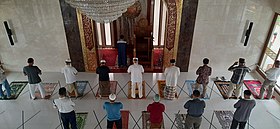
Bandung is the capital city of the West Java province of Indonesia. Located on the island of Java, Greater Bandung is the country's second-largest and second most populous metropolitan area, with over 11 million inhabitants. Situated 768 meters above sea level, approximately 140 kilometres southeast of Jakarta, Bandung has cooler year-round temperatures than most other Indonesian cities. The city lies in a river basin surrounded by volcanic mountains that provide a natural defence system, which was the primary reason for the Dutch East Indies government's plan to move the capital from Batavia to Bandung.

Malang, historically known as Tumapel, is an inland city in the Indonesian province of East Java. It has a history dating back to the age of the Singhasari Kingdom. It is the second most populous city in the province, with a population of 820,043 at the 2010 Census and 843,810 at the 2020 Census; the official estimate as of mid-2023 was 847,182. The Malang Metropolitan area was home to 3,663,691 inhabitants in 2010, spread across two cities and 22 districts. Malang is the third largest city by economy in East Java, after Surabaya and Kediri, with an estimated 2016 GDP at Rp. 44.30 trillion.

The majority of Indonesia's railways are on Java, used for both passenger and freight transport. There are three noncontinuous railway networks in Sumatra while two new networks are being developed in Kalimantan and Sulawesi. Indonesia has finalized its plan for a national railway network recently. According to the plan, 3,200 km of train tracks will crisscross the islands of Sumatra, Java, Kalimantan, and Sulawesi. It has been touted as the most extensive railway project in Indonesia since its independence from the Dutch in 1945. Indonesia targets to extend the national railway network to 10,524 kilometres by 2030. As of September 2022, the network spans 7,032 km.

Kertajati International Airport is an international airport serving the Greater Bandung and Cirebon metropolitan areas, as well as parts of the West Java and Central Java provinces, Indonesia. Now one of the two largest airports in Indonesia, it is located in Majalengka Regency, approximately 68 kilometres (42 mi) east of Bandung.
Kota Baru Parahyangan or KBP is a planned city located at Padalarang, West Bandung Regency in Indonesia. It was developed with the vision and spirit as a City Of Education. Total land area of the township is 1,250 hectares including land for 200 hectares of lakes.

Jakarta International Stadium is a retractable roof football stadium in Tanjung Priok, Jakarta, Indonesia. It is the home ground of Persija Jakarta after moving from their previous stadium, Gelora Bung Karno Stadium, and the occasional home of the Indonesia national football team, after an agreement between PSSI and PT JAKPRO to use the facility. The stadium has a seating capacity of 82,000 spectators, making it the largest stadium in Indonesia and largest football-specific stadium in Asia.

Mochamad Ridwan Kamil, alternatively Kang Emil or RK, is an Indonesian architect and politician who was the 15th Governor of West Java, the largest province of Indonesia. He was also the mayor of Bandung from 2013 to 2018. As an architect, he designed iconic structures in Indonesia and other countries in Asia with his Urbane architectural firm and lectured at the Department of Architecture, Bandung Institute of Technology.

Citayam Station (CTA) is a railway station located in West Java, Indonesia; right on the border between Bojong Pondok Terong, Cipayung, Depok and Pabuaran, Bojong Gede, Bogor Regency. The station, which is located at an altitude of +120 m amsl, is owned by Operation Area I Jakarta of Kereta Api Indonesia (KAI). The north side of the station is a part of Depok, making it the southernmost station in the city, while the south side is a part Bogor Regency, making it the northernmost one in the regency.
2017 (MMXVII) was a common year starting on Sunday of the Gregorian calendar, the 2017th year of the Common Era (CE) and Anno Domini (AD) designations, the 17th year of the 3rd millennium and the 21st century, and the 8th year of the 2010s decade.
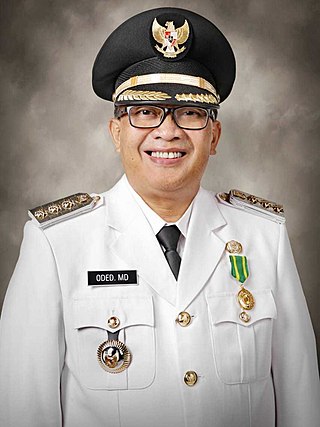
Oded Mohamad Danial was an Indonesian politician who served as mayor of Bandung from 2018 until his death in 2021. He had previously served as the deputy mayor of Ridwan Kamil, and a city councilor before that.
The COVID-19 pandemic in Indonesia is part of the worldwide pandemic of coronavirus disease 2019 caused by severe acute respiratory syndrome coronavirus 2. It was confirmed to have spread to Indonesia on 2 March 2020, after a dance instructor and her mother tested positive for the virus. Both were infected from a Japanese national.

Dedy Yon Supriyono is an Indonesian politician who is the Mayor of Tegal, Central Java, serving since 2019.
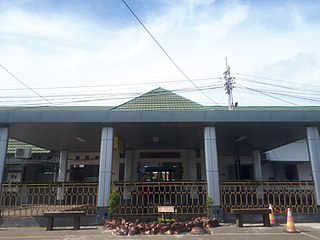
Kroya Station (KYA) is a railway station located in Bajing, Kroya, Cilacap Regency, Central Java, Indonesia. The station has nine railway tracks. It is a major junction station where the line from Yogyakarta split, where one goes to Purwokerto and Cirebon, while other head to Bandung.
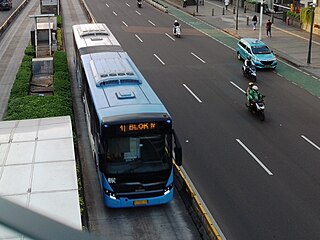
The Transjakarta Corridor 1 is the Transjakarta bus rapid transit route in Jakarta, Indonesia. The route operates between Blok M Terminal and Jakarta Kota railway station. It is the first route of the Transjakarta BRT system. The roads that are traversed by Corridor 1 are along Jalan Sultan Hasanuddin, Trunojoyo, Sisingamangaraja, Sudirman, MH Thamrin, Medan Merdeka Barat, Gajah Mada / Hayam Wuruk, Pintu Besar Utara, Kali Besar Barat, Kunir, and Lada Dalam. Key integration points include Dukuh Atas TOD that is currently an integration point for four transport modes, Jakarta Kota station which serves KRL Commuterline, and Harmoni station that is one of the main hubs in the BRT system. From Blok M to Bundaran HI ASTRA stations, this corridor is in parallel with North–South Line of the Jakarta MRT, thus many of the BRT stations are integrated directly with the MRT stations. Currently, all bus stations are served by buses 24 hours a day.

Jombang Station (JG) is a large class type C railway station located in Jombatan, Jombang, Jombang Regency, the station is included in the Operation Area VII Madiun at an altitude of +43 m. The location of this station is right across the Alun-alun Jombang. All trains passing the Kertosono-Surabaya Gubeng must stop at this station.

The Community Activities Restrictions Enforcement or CARE was a cordon sanitaire policy of the Indonesian government since early 2021 to deal with the COVID-19 pandemic. Prior to the implementation of CARE, the government had implemented large-scale social restrictions (LSSR) which took place in a number of regions in Indonesia.
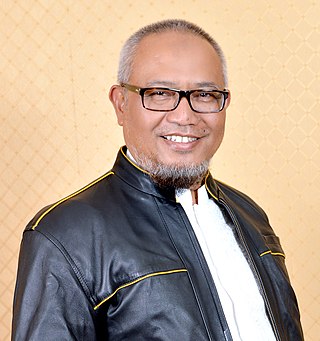
Adang Sudrajat was an Indonesian medical doctor and elected official for the Prosperous Justice Party in the People's Representative Council (DPR-RI) and Bandung city council. His second term in the DPR-RI ended abruptly due to his death from COVID-19 in July 2021.

Transjakarta Corridor 13 is a bus rapid transit corridor in Greater Jakarta, Indonesia, operated by Transjakarta. It serves the route from CBD Ciledug BRT station in Tangerang, Banten, to Tegal Mampang BRT station in Mampang Prapatan, South Jakarta; though it is currently shortened temporarily and starts from Puri Beta 2 station. The roads traversed by Corridor 13 are HOS Tjokroaminoto (Tangerang), Ciledug Raya, Kebayoran Lama, Kyai Maja, Trunojoyo, Wolter Monginsidi, and Kapten Tendean. This is the first corridor on the BRT system to operate on a separated elevated track, running via a 9,3 kilometre long and 8 metre wide dedicated elevated bus lane, with height ranging from 18 to 23 metres above ground level. The elevated track starts from Kapten Tendean Road where Tegal Mampang station is located and spans all the way to Ciledug Raya Road near intersection with Adam Malik Road, where Petukangan Utara station is located.
2023 (MMXXIII) was a common year starting on Sunday of the Gregorian calendar, the 2023rd year of the Common Era (CE) and Anno Domini (AD) designations, the 23rd year of the 3rd millennium and the 21st century, and the 4th year of the 2020s decade.
